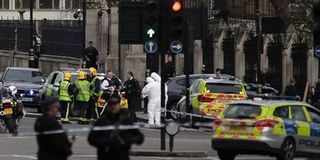Tourists stuck on London Eye due to parliament terror attack

Armed police officers stand guard as forensics officers work around the crime scene. Agencies photo
What you need to know:
- A statement from the Scottish parliament chief executive's office said: "While there is no intelligence to suggest there is a specific threat to Scotland, Edinburgh or Holyrood we have increased security with immediate effect at the Scottish Parliament as a precaution.
- Scotland was indeed outvoted by England and Wales in the Brexit referendum the following month, after it voted by 62 percent to remain in the EU.
Tourists were stuck in mid-air on the popular London Eye attraction for around an hour on Wednesday following a suspected terror attack outside the Houses of Parliament.
Visitors on the London Eye, a 135 metre (443 foot) high big wheel, were later evacuated after the attack, in which a police officer was stabbed and the suspected assailant shot.
The London Eye has a clear view over the area.
"At present we are holding all of our guests within our attractions as per tried and tested security procedures," the attraction said on its Twitter page.
The account later tweeted that the passengers "are now disembarking".
The London Eye is made up of 32 white pods, each of which can carry 25 people.
Scottish parliament suspends independence vote debate
Meanwhile, Scottish lawmakers suspended their vote for a second independence referendum on Wednesday following a suspected terrorist incident outside the Houses of Parliament in London.
The Scottish Parliament in Edinburgh was just hours away from a landmark decision to ask the British government for permission to review Scotland's place in the United Kingdom.
The ruling Scottish National Party (SNP) was expected to gain approval for its separatist ambitions with support from the Green Party, but the vote was put on hold after some opposition lawmakers left the debating chamber as events unfolded in London.
Security was stepped up at the Scottish Parliament and police cars dispatched to guard the entrance to the adjacent Holyrood Palace, Queen Elizabeth II's official residence in Scotland.
An appeal from the Scottish Conservative Party, allies of the UK Government and the main unionist opposition in Edinburgh, to have the debate suspended shortly after the attack was initially rejected.
However, opposition party leaders took to social media to complain that it would be inappropriate to continue, and the Scottish parliament's presiding officer Ken Macintosh eventually returned to the chamber to inform members that the debate would be suspended.
Security increased
"There is no reason, and certainly no wish, to cause undue alarm here," he said.
"Security has been increased here, but I am also aware... that the fact that our sister parliament had a serious incident is affecting this particular debate and it is affecting the contribution of members.
"So it is for that reason we are deciding to suspend the sitting… to continue at the moment would not allow members to make their contributions in the manner that they would wish to."
A statement from the Scottish parliament chief executive's office said: "While there is no intelligence to suggest there is a specific threat to Scotland, Edinburgh or Holyrood we have increased security with immediate effect at the Scottish Parliament as a precaution.
"In the meantime, we would ask all building users to be vigilant whilst going about business and also when leaving or coming to Parliament."
A brief pause
Scottish First Minister Nicola Sturgeon opened the two-day debate on Tuesday and was not in the debating chamber when the sitting was suspended.
Writing on Twitter, she said: "My thoughts are with everyone in and around Westminster caught up in this dreadful incident -- and with the brave emergency services."
The suspension will briefly pause Scottish nationalists' attempts to reopen the independence debate.
Scotland voted by 55 percent against independence in 2014, but the SNP was re-elected to government in May 2016 on a manifesto pledge to request another referendum if Scotland was "dragged out of the European Union against its will".
Scotland was indeed outvoted by England and Wales in the Brexit referendum the following month, after it voted by 62 percent to remain in the EU.
The planned vote in parliament on Wednesday would have given Sturgeon the green light to approach Prime Minister Theresa May for a rematch, as she does not have the authority to hold a legally-binding referendum without the permission of the British government.
May had already signalled her intention to rebuff Sturgeon’s demand, insisting "now is not the time" for more constitutional uncertainty as she prepares to seek a good deal for Britain from Brexit.




